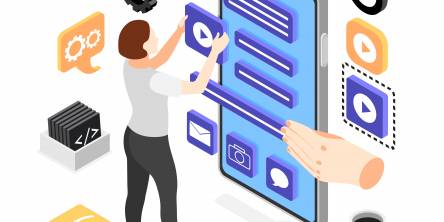Augmented Reality in Retail: Benefits and Use Cases

AR or Augmented Reality blurs the line between the real world and imagination, transforming how people shop, work, play, learn and connect with the world around them. It provides a way to visualize the world in the way that people can imagine it to be. It is one of the biggest technology trends getting more significant as AR-ready smartphones and devices become more accessible.
Statistics on AR in Retail
- As per Techjury, 63% of online shoppers believe AR will improve their shopping experience.
- According to Google Consumer Insights, 66% of people are interested in using AR for help while shopping.
- According to Shopify, on average, merchants who add 3D content to their stores see a 94% conversion lift.
- AR in retail is projected to grow at a CAGR of 13.72% from 2023 to 2027.
Benefits of Using AR in Retail
Augmented Reality or AR in retail can help turn routine shopping into a completely new experience, with customers getting to virtually try out clothes, customize and interact with products to make intelligent buying decisions.
- A novel way to engage customers - Using Augmented Reality can help customers get involved in purchasing decisions and encourages them to interact personally with different products. Customers can virtually see how the clothes fit or how the furniture looks in their environment. Such engagement usually leads to increased store conversions, boosting sales and revenue.
- Minimizing returns - Using AR, the customers can choose and buy products that suit their requirements, which helps ensure that the return of goods is minimized for both the online and brick-and-mortar stores.
- Contactless experience - With evolving e-commerce, consumers have become increasingly comfortable with online shopping. AR can help replace the physical need to interact with a product, and customers can virtually evaluate and try out the products. AR within stores can help customers try out different products without needing store assistance.
- Social media engagement - Retail brands can add extra appeal to their social media strategy by implementing AR. AR can help them generate social media content that can go viral, increasing interest in their products and brand awareness, which leads to increased sales and revenue.
- Data accumulation - AR helps retailers collect valuable data on customer interests, preferences, and shopping patterns. These can be used to deliver personalized advertising and marketing campaigns.
Use Cases of Augmented Reality in Retail
- Space visualization and virtual tours - There are many benefits of using AR in retail. Using AR, customers can take a virtual time of a store or property, and the technology lets customers experience and navigate malls and departmental stores to browse and purchase.
- In-store displays - Augmented reality windows and digital in-store displays are the best ways to engage customers and drive brand awareness. It allows customers to interact with the store merchandise and advertise new products. The dynamic augmented reality displays can track and capture real-time analytics data and be updated to display the most viewed or purchased items.
- Virtual fitting rooms allow shoppers to try on items without physically trying or touching them. Such virtual displays allow stores to showcase merchandise that may not be in stock. This virtual fitting room market is predicted to grow from USD 3 million to USD 6.5 million by 2025.
In conclusion, from space visualization to virtual try-ons, AR technology offers retail businesses new opportunities for customer interaction and increased customer shopping experience. With the rise in AR-enabled devices and the availability of AR apps, it's easier to implement AR in the retail business. Partnering with a retail software development company can help seamlessly integrate AR into the retail industry.
Similar Articles
Discover how expert book printing solutions transform manuscripts into high-quality printed books. Learn about the process, materials, customization options, eco-friendly practices, and the future of modern book printing.
Architectural 3D rendering price guide covering costs, factors, AI impact, and typical pricing for residential and commercial exterior and interior renders.
Most large organisations already know how hard enterprise application testing can be. You’ve got old and new systems talking to each other, custom code layered on vendor platforms
When it comes to working at heights, safety and efficiency are paramount. Aerial work platforms (AWPs) have revolutionized how professionals approach elevated tasks across countless industries, from construction sites to warehouse operations.
The modern age of customers expect constant availability, no matter what the offer. And for that, the market requires rapid innovation cycles. In such a high stakes environment, technology infrastructure is more than just a cost center.
When evidence seals fail, cases weaken. Explore how compromised chain of custody can derail investigations and jeopardize justice.
Compare hydraulic and traction residential elevators to find the best fit for your home. Learn how each system works, their pros and cons, space needs, energy use, and maintenance requirements.
Extend the lifespan of your commercial marina docks with proactive maintenance. Learn essential inspection routines, material-specific care, and safety tips to protect your investment and ensure long-term dock performance.
Learn the key factors in designing an engineered fall protection system. Discover how hierarchy of controls, task analysis, structural integrity, and fall clearance ensure safety and compliance.









